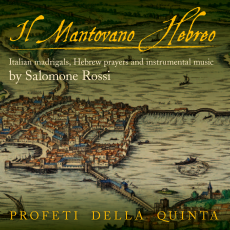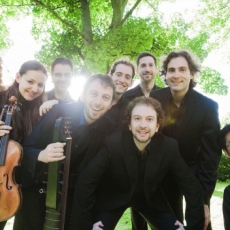Profeti della Quinta - Salomone Rossi: Il Mantovano Hebreo - MusicWeb International
Surrounded by tranquil lakes and dramatic mountains; and in the same place as Romeo sought Juliet's love, one may ask: ‘Welcome from Mantua: what says Rossi?'.
Amongst Monteverdi, Gastoldi, Wert and Viadana, Salomone Rossi was a composer of fashionable music for banquets, wedding feasts, theatre productions, and other such frivolities amongst the high-society of Mantua. Most interestingly, as a composer of both secular Italian and Hebrew liturgical music, he defied discriminatory boundaries and broke free from all inhibiting restrictions to publish the first Jewish music using European notation. As an exquisite Italian-Jewish violinist and composer, he was so esteemed that he was excused wearing the yellow badge that was required of Jews in Mantua. However, it is likely that Rossi died as a result of the Austrian defeat of the Gonzaga dukes - Rossi was a popular composer and performer at their court - and destruction of the Jewish ghetto in Mantua which was subsequently ravaged by the plague. Performed by the formidable Profeti della Quinta - an Israeli group primarily consisting of two counter-tenors, two tenors and a bass - Rossi is finally accorded the spotlight and is not upstaged by the ever-popular Monteverdi.
Inspired by the poetry of the day written by Ottavio Runuccini, Giovan Battista Marino, Giovanni Guarini, Livio Celiano and Gabriello Chiabrera, Rossi's madrigals are elegant and refined. Rossi's music is suffused with the poet's anguished lament and painful grace and echoes Guarini's declaration that ‘To torment for you is sweeter / Than to be happy for another.' With contrapuntal lucidity and minimalist expression, these pieces are arrestingly beautiful segments of late sixteenth century Mantua. Performed with the chitarrone (also known as a theorbo) alongside the canto, Rossi's compositions blend the sixteenth-century polyphonic with the new monodic style of the seventeenth century. Illustrative of this admixture, Rossi's arrangement of a poem by Giovanni Guarini entitled 'Cor mio, deh non languire' (1600) is a quiet and desperate declaration of love amidst loss: ‘But, alas, lives the one, who unjustly dies / For keeping his heart alive in another's breast'. With technical flare and free flowing limpidity, Doron Schleifer's counter-tenor voice is pure silk. In each performance, he delivers melting notes through Rossi's swooning melodies. However, it is in 'Ohime, se tanto amate' where the music is heavy with poetry to such an extent that the soul itself seems to be crying out, pleading for solace. Suffering from burning tears, to quote Guarini, ‘A single languid and sorrowful ‘alas'' opens this piercingly beautiful piece which speaks intimately and affectionately. With this outspoken intimacy, the Profeti della Quinta delicately permeate each performance with the scents and spices of late Renaissance verse.
Light and rhythmically tight, 'Concerto terza', 'Gagliarda disperata' and 'Correnta sesta' are examples of Profeti della Quinta's firm grasp of Italian Baroque. This ensemble performs with flare and fiery vividness. Sometimes steadfast and consoling, as in 'Sinfonia quinta' and 'Sinfonia decima', the measured musical direction of Elam Rotem holds this group of musicians together, but does not shackle the improvisatory quality of the music. Ori Harmelin and Royosuke Sakamoto accompany the cantos (Doron Schleifer and David Feldman) and tenors (Dino Luthy and Dan Dunkelblum) with sensitivity and restraint, all the while producing a full and enriched tone. With such emotively heartening and musically spacious performances it is unsurprising that Profeti della Quinta were the recipients of the Young Early Music International Artists Competition award. Having a natural affinity with Rossi, and its vocalists as native Hebrew speakers who specialise in Italian Baroque, the overall sound of this group is both refreshing and retrospective as it reflects and revives the madrigal's genesis.
Ending with balanced harmonies in the tender and earnest 'Psalm 126: Shir hamma'a lot, beshuv Adonai', this CD is replete with consummate musicianship. Not only is the diction and phrasing exact and imbued with character, but this music is enlivened by genuine youthful excitement. With the contagious enthusiasm of instrumentalists and singers alike, I defy any listener to not be utterly entranced and uplifted by this gracious and cavorting music.

